


To Steven Pinker and Stephen Camarata ,friends in need and friends indeed.
ix
xiii
This book is about a very special set of children who have seldom been studied before-children who are exceptionally bright and also exceptionally slow to develop the ability to speak.
The first study of a group of such children was my book LateTalking Children, published in 1997. That book was primarily about a group of 46 youngsters, whose parents formed a network across the country. This book is not primarily about that group, but incorporates new information from scientific studies, as well as new personal histories, and data from a subsequent study of a new group of 239 children like those in my group by Professor Stephen M. Camarata, a speech-language pathologist at the Vanderbilt University Medical Center. The Einstein Syndrome also draws upon many personal histories of people who were not part of either group.
While some people saw Late-Talking Children as simply anecdotal evidence about individuals, The Einstein Syndrome begins by focussing in the first chapter on hard statistical data about the highly unusual individual and family patterns found in both my group and Professor Camarata's group. Against that background, subsequent discussions of individual histories can be seen as confirmations and examples of those patterns, rather than as mere isolated anecdotes. Moreover, most of these histories are about different people than those covered in the first book.
Once the patterns have been established, both from statistics and from histories of flesh-and-blood people, the next step is to seek some explanations of these highly unusual patterns. That is attempted in Chapter 4 ("Groping for Answers"). Chapter 5 then goes into the painful dilemmas involved in evaluations of these children and Chapter 6 considers the pros and cons of putting a particular child in a particular early intervention program. Finally, Chapter 7 deals with what parents can do to cope with the uncertainties that remain, even after our best efforts to determine why this set of bright children talk late, and deals with the even more difficult question as to why a particular parent's particular child talks late. Some afterthoughts about the further implications of this study are expressed in the epilogue.
There are no easy answers or magic formulas. Yet there is enough solid information to enable parents to resist those who claim to have easy answers or magic formulas.
For many parents, the most serious problem with their late-talking child does not come from the speech delay, as such, but from the fears surrounding what that delay might mean for the future and from the reactions of other adults to that delay. Relatives, neighbors, teachers, day care center workers and others have often inflicted much needless anxiety and anguish on parents with thoughtless remarks and reckless attempts at diagnosis. Mothers are especially likely to be blamed for the child's speech delay, even when the same parents have raised other children who talked at the normal time or even earlier than normal. Perhaps worst of all, there are people who exploit parental fears to try to steer their children into programs that may not be right for the particular child.
There are so many wholly different reasons why children talk late that there can be no one-size-fits-all explanation or treatment. Deafness, mental retardation, autism, and physical problems with ears, tongue or palate are all possibilities. So is the special set of characteristics discussed in this book and called the Einstein syndrome, where none of these disabilities is present, but where the child follows a special development pattern found in a number of both famous and unknown people-including, of course, Albert Einstein.
No responsible parents are likely to simply assume that their particular late-talking child has the Einstein syndrome without having had physicians and others test for and rule out more dire possibilities. If anything, parents are more likely to continue to worry, even after repeated tests turn up nothing wrong, while the child shows every sign of being very bright and exhibits all the other characteristics discussed in this book.
In addition to their natural concerns and apprehensions, parents may be subjected to pressure from others to "do something." These may be relatives, friends, neighbors, or people promoting various programs in schools or elsewhere. But, if qualified medical and other highly-trained specialists say to let the child develop in his or her own way, then that may be the "something" that should be done.
For other children-perhaps most children who talk late-early intervention may be the way to go. Children with the characteristics discussed in this book are probably a minority among those who talk late.
Most parents of the kinds of children discussed here have never seen another child like their own. Letters that poured in to me after I first publicly discussed this subject often expressed a great sense of relief just to know that there was another child somewhere with the same set of characteristics as theirs. Yet such children are not quite as rare as they may seem. Over all, I have heard from the parents of well over a hundred such children.
Parents who know of no other child like their own may nevertheless know some adult who went through the same stages as a child. Such adults seldom talk about such things and many are themselves wholly unaware of having gone through such stages as small children. Two friends of mine discovered that they had been late-talkers only after they mentioned my study to their mothers. My college room mate knew that he had talked late, but I learned about it only years after we had both graduated. In short, while children with the characteristics described in this book are rare, they are not quite so rare as they might seem to their parents.
Thomas Sowell
Hoover Institution
Stanford University

This study would have been impossible without the cooperation of many parents, who filled out long questionnaires and wrote numerous letters describing their experiences and the experiences of their late-talking children. Professor Stephen M. Camarata of Vanderbilt University has been enormously helpful, not only to me but also to many parents who wrote to him for advice, for referrals, or to join his support group of parents of children with speech delays. His generosity in making his statistical data available to me has been an invaluable contribution to this book. An even more important role, in the long run, is his on-going research on bright children who talk late, drawing upon his own professional training in this area and both his clinical and personal experiences. As he follows these children into adulthood in the years to come, much more will become known, not only about these children but also about the validity or lack of validity of various evaluations that they have received. Since I am not of an age to expect to be able to follow the children in my group into adulthood, Professor Camarata has kindly agreed to include them in follow-up studies when I am no longer able to do so.


















